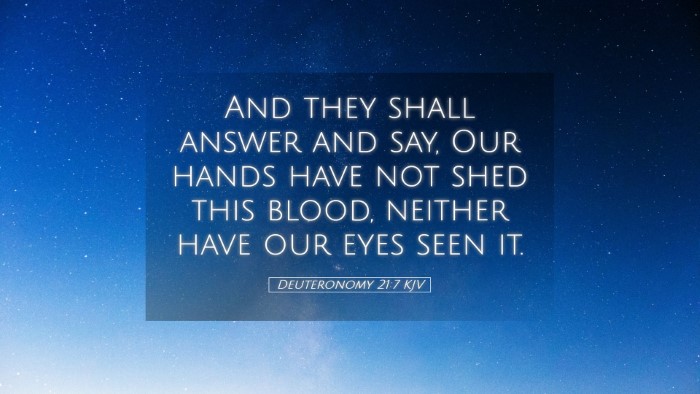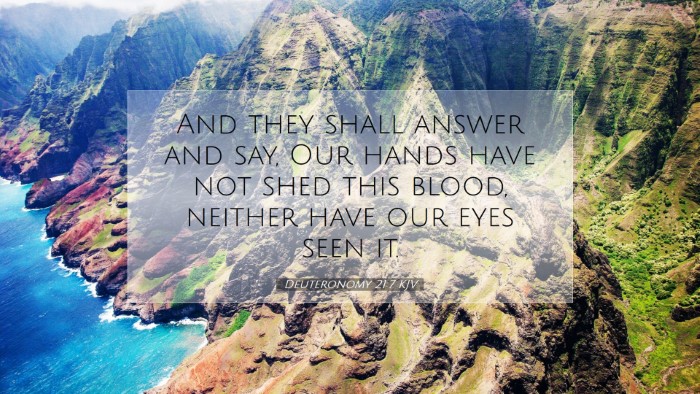Commentary on Deuteronomy 21:7
Bible Verse: “And they shall answer and say, Our hands have not shed this blood, neither have our eyes seen it.” (Deuteronomy 21:7)
Introduction
The verse at hand is part of a broader section in Deuteronomy that outlines the procedures for dealing with unsolved murders in Israel, helping to uphold justice and maintain societal sanctity. This commentary seeks to provide insights from esteemed public domain scholars, with a focus on the implications of communal responsibility, justice, and the nature of innocence.
Contextual Background
Deuteronomy presents Moses’ final speeches to the Israelites before they enter the Promised Land. The laws given are designed to establish a covenant community that reflects God's holiness and justice. Within this framework, Deuteronomy 21:1-9 addresses the problem of unsolved murders, which posed a serious dilemma for a society seeking to live in right relationship with God and each other.
Interpretative Insights
-
Matthew Henry's Commentary
Matthew Henry emphasizes the seriousness of bloodshed and the weight of responsibility that rests upon the community. He explains that the elders of the city are to declare their innocence in the matter, acknowledging their separation from the crime. This self-affirmation is essential to maintain their moral integrity and communal sanctity, highlighting that blood guilt is not merely a personal affair but a collective burden.
-
Albert Barnes' Commentary
Albert Barnes focuses on the procedural aspects of this law. He notes the importance of declaring innocence, as the act of shedding innocent blood carries significant spiritual ramifications. Barnes points out that this ritual is an acknowledgment before God and an appeal to His judgment. The declaration serves to relieve the city from guilt, with Barnes underscoring the need for transparency and accountability in leadership.
-
Adam Clarke's Commentary
Adam Clarke provides further elaboration on the implications of this verse by stressing the necessity of atonement in the absence of a known perpetrator. According to Clarke, the statement of innocence reflects a responsible attitude toward justice and moral conduct. He interprets this ritual as a way for the community to express their detachment from the crime while also acknowledging their duty to uphold righteousness in society.
Theological Implications
This verse raises several theological considerations that are crucial for the pastoral and scholarly community:
-
Communal Responsibility: The declaration of innocence underscores the principle that a community is not only defined by its individuals but by their collective actions and moral stance. It posits that communities hold a share in the ethical climate of their surroundings.
-
The Nature of Innocence: Innocence is a profound biblical theme. The community's response in Deuteronomy 21:7 highlights that moral purity and a clear conscience can be crucial in community practices and in seeking God’s favor.
-
Justice and Accountability: The call for the elders' declaration reflects a deep-seated belief in justice and accountability, showing that in light of severe moral transgressions, even unintentional ones, communities must be proactive in addressing guilt and seeking forgiveness.
-
God's Sovereignty: The verse also reflects on God's ultimate authority over justice. The community appeals to God, recognizing Him as the final arbiter of justice and morality. This reliance encourages faith in divine providence in the face of ambiguity and unresolved evil.
Practical Application
For pastors, students, and theologians, Deuteronomy 21:7 serves as a reminder of the importance of integrity in communal leadership. Here are practical insights for modern contexts:
-
Encouraging Collective Integrity: Pastors are encouraged to foster a culture of collective integrity within their congregations, where issues of sin and wrongdoing are addressed truthfully and lovingly rather than brushed under the carpet.
-
Creating Safe Environments for Acknowledgment: Churches and communities should create spaces where individuals can confess, seek forgiveness, and take responsibility for wrongs—both personal and communal.
-
Implementing Accountability Structures: Just as the elders were accountable, modern church governance should emphasize accountability structures that ensure leaders are held responsible for their actions and decisions.
-
Promoting God's Justice: The church's role includes advocating for justice in society, ensuring that the weight of communal guilt is addressed, alleviated, and transformed through action and prayer.
Conclusion
Deuteronomy 21:7 stands as a compelling testament to the intertwining of communal responsibility, justice, and divine sovereignty. Public domain commentaries offer a rich tapestry of insight into this scripture, affirming its lasting relevance in guiding ethical behavior and communal integrity among God's people. For pastors and believers today, these insights can inspire deeper reflection on the nature of guilt, innocence, and the pursuit of justice in a world that often seems indifferent to such values.


